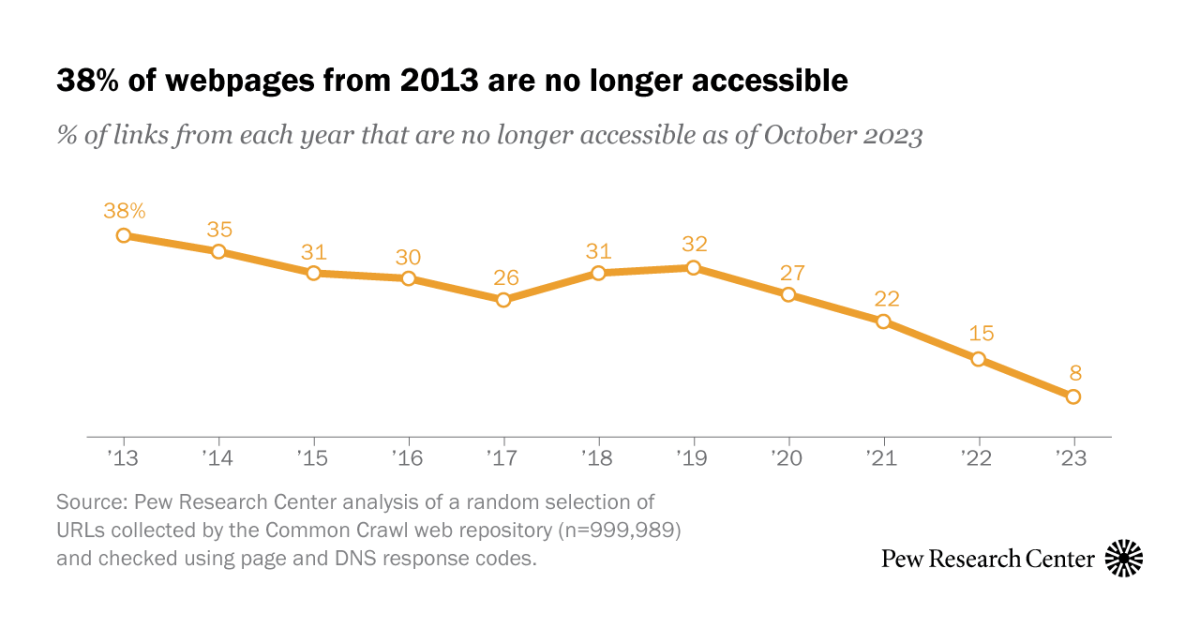54% of Wikipedia pages contain at least one link in their “References” section that points to a page that no longer exists.
It would be interesting to know how many of these references don’t exist anymore and how many have just moved. Web has come a very long way since 2013 and I bet that websites hosting the references have undergone several iterations altering the URLs in some way.
That, in and of itself, is also a problem! First of all, because such pages often fail to return a
HTTP 301 moved permanentlyresponse, and second (but perhaps even more importantly) the reason they move is because the site transitioned from using static, human-readable URLs to some kind of unstable CMS-managed non-descriptive gibberish that breaks caching and linking. It’s an intentional siloing and hoarding of content.deleted by creator
The online era is going to be a thousand Library of Alexandria’s worth of lost information, records, journals, news, … everything. It will all just digital-rot into the memory hole.
And when trying to find a backup, no search engines can find it due to the AI garbage fucking up the SEO
Well put
I wonder how this compares the the number of businesses that existed in 2013 that no longer exist. I wonder for two reasons:
- Is 38% similar to the typical rate of failure for businesses and other ventures?
- How much of the 38% can be explained by closure of high-risk businesses like restaurants?
Something else that could explain a lot of it is webpages that were always intended to be ephemeral. Political campaign websites for instance.
Also… I once created hellblade.com. We sold gaming computers with cases that changed colour with heat in the UK. Was a total disaster. Now it’s some big game franchise. Wish I’d kept the domain.
disgusting. it’s like early TV where people thought it was low-rent crap and not worth saving.
it always seems impractical to store this stuff but then it goes away and you realize how much you’re missing.
Makes me wonder how many dead links and webpages there must be
well a friend made a site called lookingupthebuttofadeadbear.com and it isn’t accessible anymore but i don’t think anyone misses it
I was just listening to a YouTube playlist of mine that goes back at least 10 years and was disappointed how much of it was deleted. And not only that, but in many cases I couldn’t even tell what the videos were.
Literally just today, I picked one music video that just seemed to be gone from youtube and the internet, but thankfully was able to find a Wayback machine link to the artists website in 2008 with a .mov download link.
Information has a half life. And for digital information it’s really short. I always thought the digitization of documents and media is a bad idea for this very reason. Photo albums are not as common anymore, more people read through screens. All the information is getting stored in devices that expire, get thrown away, or that won’t be able to be accessed in a couple decades.
Think about all of the information that we have stored right now digitally. If nothing is actively done to keep it safe, how much of it do you think will survive in 100 years? Instagram, Facebook, and Google will not be around forever. Your personal photo galleries videos and files WILL be lost unless someone deliberately curates them for preservation.
Welcome to the future of the internet. Good luck trying to find a 2 days old news article on facebook from a big publisher, because you wanted to read the comments.
I have said multiple times before that 2013 was the worst year ever. I’m still proud of that opinion, but maybe, just MAYBE, there was something good about that year after all, so it wasn’t all darkness and rainstorms.
It had MOAR websites to access.






